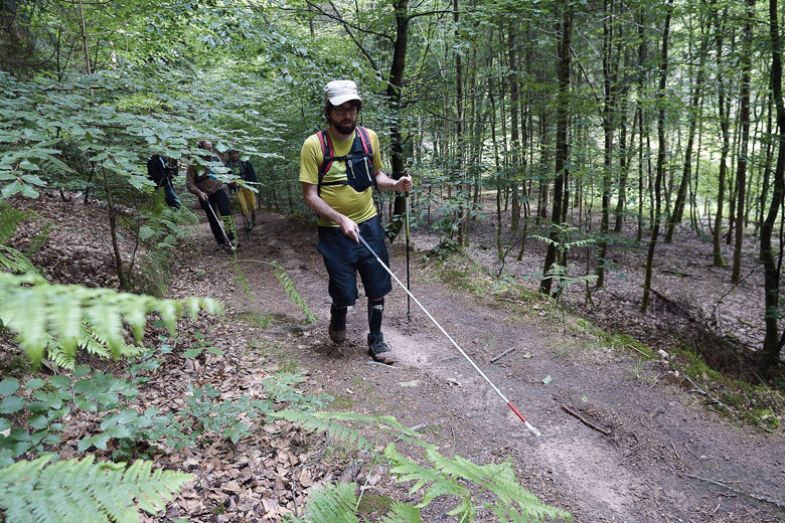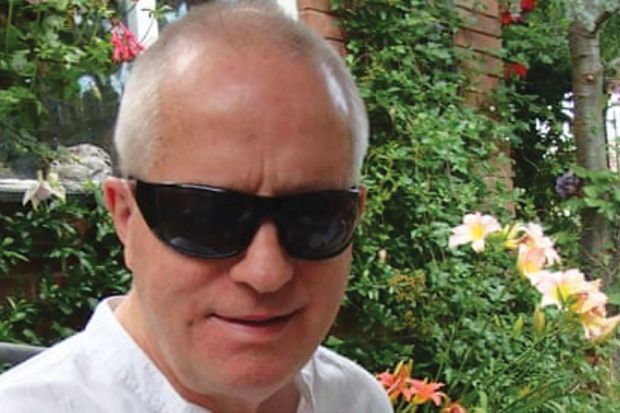One night in late 1964, I assisted at a bizarre ritual that involved three blind men climbing up a drainpipe. I have been thinking back to that incident, and the friendship with a remarkable blind academic it led to, in light of the coronavirus.
In July, the UK’s Royal National Institute for Blind People launched its World Upside Down campaign to highlight a largely ignored effect of the pandemic. Social distancing is very difficult for blind people, they point out, with two-thirds of those surveyed saying they have lost some of their independence as a result.
Reading about this made me reflect on the changes in both technology and attitudes I have seen in my lifetime that have gone some way to making lives easier for blind people. But it also made me want to pay tribute to the extraordinary resilience of my friend and colleague Roger Williams and to acknowledge all that I learned from him.
The drainpipe I mentioned led Roger and the two other undergraduates to the easily opened window of the junior common room in Queen’s College, Oxford. I had been drinking with them because they were school friends of a friend of mine who had some sight. In those days, Oxford college doors and gates shut for the night, normally at 11pm, and latecomers had to make their way back in by the known unofficial routes.
A decade later, Roger Duclaud-Williams, as he now was, having married a French woman, became a lecturer in the department of politics at the University of Warwick, where I already had a job. We were friends and very frequent companions, usually lunching together and often travelling to and from work together. I would also walk with Roger, holding his elbow, although attempts at country rambles over rough ground proved difficult. I never shared his love of jazz, but was with him all the way in his exploration of the varieties of “real beer”.
Going to football with Roger wasn’t an enormous success, but the races were. He regarded being a punter as a serious intellectual activity and I have vivid memories of reading to him from the Racing Post about how horse X had beaten horse Y at Kempton Park, though that was over a shorter distance and on heavier ground than today’s race. This was far more detail than I would ever have bothered with on my own.
Roger died in 2012 and I still miss him. Not in a soppy way – he would have hated that – but in a specific intellectual way. I still have moments when I am curious about his opinion on something or want to put an argument to him before the speedy and inevitable realisation that it’s not going to happen. Brexit would have been the extreme case: I support it and he would have opposed it, but we could have discussed it at length without rancour.
Lunch always started with Roger eating whatever he had that was sweet – cake or fruit – before his sandwiches and simultaneously beginning his cross-examination: “If, as you claimed yesterday...” This is not an obituary but an exploration of what there is to be learned from knowing a highly intelligent blind man for nearly 50 years, 30 of them as a close colleague.
I must make it clear that everyone regarded Roger as a remarkable person. He was completely blind, but had no dog and used his white stick principally as a signal of his condition. He travelled alone around the US on Greyhound buses. He hitch-hiked! When it was put to him that perhaps things could go wrong, he laughed and said he would cross that bridge when he came to it. He much preferred my banter (Roger: “I saw your wife yesterday”; Lincoln: “No, you didn’t – you're blind”) to the audible whisperings of “Isn’t he wonderful?” we could sometimes hear as he passed. He was my model of unsentimental tough-mindedness and had utter contempt for any mealy-mouthed theological justification of how a loving and omnipotent God could allow him to be afflicted. Instead: “Shit happens. Get on with it.”

Blindness, by definition, means a lack of visual awareness – and being as tough as Roger was meant not bothering to correct your lack of visual awareness. I used to chide him for dressing exactly the same way in winter as in summer because he wasn’t aware that other people had coats and hats on; he shivered, but he was hardly ever ill. His facial expressions always expressed his emotions in a completely candid way. On the racecourse, this could be pure delight as the horse he’d backed was called home at the front. In the seminar room, when someone was talking guff or sliding into contradiction, Roger’s muted laugh of contempt was something few speakers would welcome.
Professionally, Roger was a good teacher and a wonderfully constructive critic of work in progress. His expertise was in the policymaking process and he had many interesting things to say about it, but he struggled with producing published work of his own – something that is exponentially more difficult if you are blind. He was certainly one of the most regular and disciplined workers I knew in academic life because the organisation of his squadron of readers required him to be in the office all day, every day.
The first and simplest lesson I learned from him was a sense of contempt for problems. So your garage bill is astronomical, your book has been badly reviewed and your team failed to win the cricket trophy you thought you were going to win. Diddums! Try being a blind man living on his own with little money to spare. (He and Hélène had, in their rational way, agreed to part when the younger of their two children reached adulthood.)
I was one of many people who found Roger’s toughness inspiring, but there was a great deal more to be learned in his company. For example, as Warwick had set itself up to be blind-friendly, there were other blind lecturers and students about. One consequence was that I became extremely suspicious of any kind of visual aid in teaching and often boasted that I was not going to use any technology not available to Socrates. (Today, in universities with hundreds of international students, some of whom don’t understand English very well, that might get me sacked.)
But that was the tip of an iceberg: in Roger’s company, I learned a suspicion of the value of the visual as such. To him, a horse was something to feel and smell and to hear galloping through the mud. But it was primarily a set of propositions aspiring to be facts: a sire, a dam, a size and a set of details about past races all merging into an estimated level of probability. In other words, his blindness gave him a kind of pure intellect of language and logic. He was a superb interrogator and adviser because he could focus entirely on the structure and coherence of what was being said.
We all know the cliché that a picture is worth a thousand words. It is sometimes said to have been first uttered by an American journalist called Tess Saunders about a century ago, but the basic sentiment goes back to an ancient Chinese proverb and has been endlessly repeated. Yet it doesn’t look so clever when you’re in the company of a blind person. In what respect and to whom does the value of a picture accrue?
Pictures can actually say anything you want them to say, depending on how they are angled and chosen. Think of the disingenuous George Orwell, basing his evaluation of the state of capitalism on the photograph of a woman on her knees scrubbing when he might have chosen one of the same woman enjoying a Saturday night dance. Think of how newspaper editors choose their photographs of politicians. The value of pictures accrues to propagandists and not to those who seek to engage in sincere intellectual inquiry.
I took Roger to many events and places – although never, of course, to an art gallery. Perhaps it would have been fun to describe a Botticelli or a Miró to him, but it wouldn’t have got us very far: it was surely as impossible for him to imagine a painting as it was for me to imagine being blind.
Yet knowing Roger also led me to reflect on the value of the visual arts. I’d love to qualify fully as a Philistine, but I don’t: I go to galleries, buy art, watch art programmes and have even been on courses. Nonetheless, I have to conclude that art is trivial; it’s nice, but it doesn’t “say” anything at a serious intellectual level. Otherwise, not being able to see would make you less than human, wouldn’t it? Whereas Roger seemed more than normally human.
In some ways, this parallels our discussions of music. Roger had a curiously intense loathing of Mozart and when I asked him why, he said that it was because you always knew which note was coming next. He loved jazz because it was spontaneous and moody, completely disconnected from the rational world he inhabited most of the time.
There’s a consoling fable that if you are blind, the other senses intensify to compensate. Sadly, it’s not true: in his sixties, Roger’s hearing began to deteriorate. He had a preternatural ability to identify beer, though usually when I introduced him to a new one he pronounced it too sweet.
But what he also had, as a highly intelligent blind man, was an intellect stripped down to its essentials, free of baggage and imagery. And that is why, although our political positions were different, I knew of nobody who could better interrogate me about my beliefs and their implications than Roger could.
Too often, even in the academy, a lot of noise is made without any significant light being cast. I wouldn’t, of course, wish blindness on anyone. But goodness knows that we could do with more academics – not to mention politicians – able to see through a specious argument as well as Roger could.
Lincoln Allison is emeritus reader in politics at the University of Warwick.




